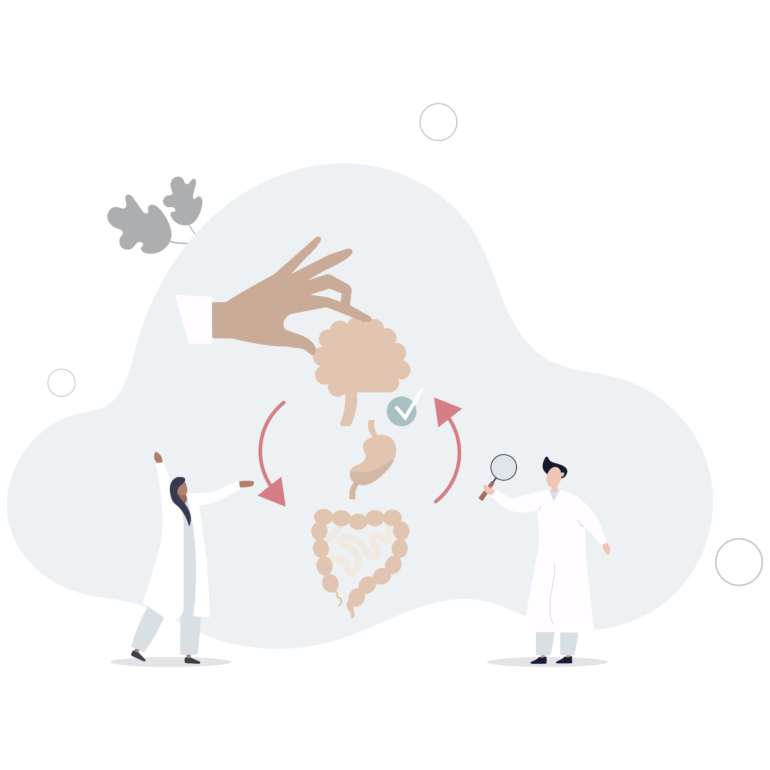The gut-brain axis is the communication network that links cognitive and emotional processing of the brain to the body’s gastrointestinal functions. The bedrock of this axis is bidirectional communication between the central nervous system and the enteric nervous system. The gut-brain axis plays a critical role in food intake, metabolism, insulin levels, perceptions of satiety, and mood to name a few. The functioning of the gut-brain axis can be influenced by diet, sleep quality, environmental toxins, social surroundings, and the experience of stress among other factors.
A critical component of the gut-brain axis is the gut microbiota or gut microbiome. This is a sophisticated ecosystem of archaea, bacteria, fungus, and viruses that exists within the digestive track. These components of the gut microbiome interact with other bodily functions and processes to impact health and well-being. For instance, the gut microbiome can impact both the cognitive and physical health of a person. When in balance, this can lead to improved health outcomes. When out of balance, this can contribute to poor health outcomes.
A growing body of evidence has linked gut-brain axis dysfunction to a wide range of neurological (e.g., Alzheimer and Parkinson’s diseases) and psychiatric disorders. These psychiatric disorders include anxiety, mood (i.e., depression and bipolar), and psychotic (e.g., schizophrenia) disorders to name a few (for an expanded list, see Table 1).
Table 1: Gut-Brain Axis Dysfunction and Co-occurring Conditions

Because of this, along with several other factors, mental health providers likely work with or encounter clients impacted by varying degrees of gut-brain axis dysfunction on a regular basis. As such, mental health providers and professionals working in allied fields of study are encouraged to become gut-brain axis informed. By becoming informed, professionals will be in a better position to understand, support, treat, and refer clients to appropriate providers who have advanced expertise in the area of gut-brain axis functioning.
Why is this important? For example, a healthy and balanced diet has been linked to lower levels of depression whereas unhealthy dietary habits are associated with higher levels of depression. Therefore, a client who experiences gut-brain axis dysfunction may also benefit from working with a licensed nutritionist in conjunction with a mental health provider. Another example would be for a mental health clinician to consider referring a client to a qualified exercise specialist in order to develop an individualized exercise prescription plan. Both dietary and exercise-based interventions not only help improve emotional and behavioral health, but can also play an important role in improving digestive health functioning. These are just two examples to consider in the development of a holistic and integrated intervention plan for clients diagnosed with a mental health disorder and who are experiencing co-occurring digestive health complaints. The relationship between the gut-brain axis and mental health may be bidirectional in nature, where gut health contributes to mental health problems and vice-versa. Therefore, optimizing healthy brain and gut health functioning is of great clinical importance.
Better understanding how the gut-brain axis is linked to behavioral, emotional, cognitive, and physical health issues has the potential to improve the effectiveness of mental health treatment. Empirical research has linked mental illness with dysbiosis or imbalances in the gut microbiota. In turn, dysbiosis influences several processes associated with mental health including the immune system, metabolism, and neurotransmitter regulation and synthesis. In particular, the gut-brain axis has demonstrated influences on neurotransmitters such as dopamine and serotonin. Both of these neurotransmitters have long established associations with depression and anxiety. Beyond this, several other factors can adversely impact gut-brain axis functioning (See Table 2 for an expanded list).
Table 2: Potential Factors Linked to Gut-Brain Health Axis Dyfunction

Wider recognition and acknowledgement of the role of the gut-brain axis in mental illness is critical among mental health clinicians and other healthcare providers. A critical component of this should be an increased understanding of how diet and lifestyle can impact the gut microbiome, which in turn influences mood and thought patterns. Mental health clinicians are strongly encouraged to ask questions about a client’s gut health during the intake, screening, and intervention process. However, prior to doing this, increased awareness, education, and training as it pertains to the gut-brain axis is recommended.
Although outside of the scope of this article, this author also encourages mental health providers and professionals working in allied fields of study to learn about the emerging field of psychogastroenterology (a topic which will be examined in greater detail in a future article). To briefly describe this topic, psychogastroenterology is a subfield of psychology that is dedicated to the study and treatment of organic digestive disorders and their associated psychological vulnerabilities. Research in this area has advanced our understanding of the gut-brain axis and helped identify promising interventions. Interventions discussed within the psychogastroenterology literature typically include cognitive behavioral therapy, mindfulness training, and hypnosis along with medication. The primary goal of these interventions is the improvement and management of digestive disorders and related symptoms. In the meantime, learning about the signs, symptoms, and red flag indicators of potential gut-brain axis dysfunction is suggested (see Table 3).
Table 3: Potential Signs, Symptoms, and Red Flag Indicators of Gut-Brain Axis Dysfunction (The manner in which the signs and symptoms of gut-brain axis dysfunction may manifest can vary widely)

Key take away points
Below are several important reminders and key take away points professionals need to consider when learning about the gut-brain axis and its implications for the mental health field:
- Vast amounts of research support the fact that the gut-brain axis plays a pivotal role in understanding the complexities of mental health and other related disorders.
- Mental health providers and professionals working in allied fields of study are strongly encouraged to become gut-brain axis informed.
- The gut-brain axis is a complex bidirectional communication network.
- The gut-brain axis includes the enteric and central nervous systems that also influence various metabolic, immune, endocrine, and neuronal pathways.
- Dyfunction in the gut-brain axis has been linked with numerous behavioral, cognitive, and physical health disorders.
- When studying the gut-brain axis, it is also important to understand the autonomic nervous system and hypothalamic-pituitary-adrenal (HPA) axis.
- Healthy gut-brain axis functioning is required in order to achieve optimal health and well-being.
- The causes for gut-brain axis dysfunction are many and varied and have been linked to a number of prenatal and postnatal neurological, biological, social, family, environment, behavioral, and physical health factors.
- Problematic lifestyle factors such as living a sedentary lifestyle, consuming unhealthy foods, smoking cigarettes, using drugs and alcohol, engaging in excessive screen time exposure, and not receiving the recommended number of hours per sleep each night can adversely impact gut-brain axis functioning.
- Problematic emotional mood states have been linked with suboptimal gut-brain axis functioning.
- Substance misuse and other addictive tendencies can adversity impact gut-brain axis functioning.
- Helping clients engage in improved lifestyle practices can play a major role in enhancing healthy gut-brain axis functioning.
- Professional organizations and academic institutions are encouraged to create and offer advanced training and education programs that focus on the behavioral health aspects of gut-brain axis dysfunction.
- Professionals working in the mental health arena and related systems of care are encouraged to learn about the emerging field of psychogastroenterology.

Jerrod Brown, PhD, MA, MS, MS, MS, is a professor, trainer, researcher, and consultant with multiple years of experience teaching collegiate courses. He is also the founder and CEO of the American Institute for the Advancement of Forensic Studies (AIAFS). Brown has completed four separate master’s degree programs and holds graduate certificates in Neuroscience and the Law, Neuropsychology, Autism Spectrum Disorder (ASD), Other Health Disabilities (OHD), and Traumatic-Brain Injuries (TBI). In 2023, Brown completed a diabetes care and education certificate from Central Arizona College. Brown has also conducted over 200 workshops, webinars, and on-demand trainings for various organizations and professional and student audiences. He has published several articles and book chapters, and recently, co-edited the book Forensic Mental Health: A Source Guide for Professionals (Brown & Weinkauf, 2018) with Erv Weinkauf. He is also regularly featured on several national and international podcast programs. Jerrod01234Brown@live.com
Other articles
Revisiting Records: Guidance and Consideration on Best Practices
State Boards are often sparse on language defining what is required of clinicians for their clients’ records. They may not offer much in the way of guidance beyond the bare minimum of dates and types of service, and that’s because many of the record content requirements are often associated with the standard of care of the profession at a whole (and in fact, some states, such as California, will explicitly state records to be kept to “the standards of the profession”).
The Assisi Manifesto
In July 2023, over a thousand psychotherapists from over 50 countries and of every orientation gathered in Assisi (Italy) for three days to celebrate family therapy, its impact and potential, and to exchange ideas. The conference was entitled Family Therapy: The Road that Connects Individual and Social Resources. It was initiated by the Accademia di Psicoterapia della Famiglia in Rome, and was sponsored by the American Academy of Marital and Family Therapy (AAMFT), the Australian Academy of Family Therapy (AAFT), the Asian Academy of Family Therapy (AAFT), the European Family Therapy Academy (EFTA), and the World Association of Social Psychiatry (WASP).
Maurizio Andolfi and the International Faculty
An American Take on the Manifesto
Let me paint a picture for you of the Assisi Conference last July 2023, which spawned the Manifesto: Imagine an auditorium with banked seats, a thousand enthusiastic family therapists waiting for a plenary to begin. People are chatting in many different languages. People are getting up to hug old friends and shake hands with new ones.
Mary Hotvedt, PhD



